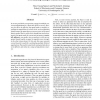Free Online Productivity Tools
i2Speak
i2Symbol
i2OCR
iTex2Img
iWeb2Print
iWeb2Shot
i2Type
iPdf2Split
iPdf2Merge
i2Bopomofo
i2Arabic
i2Style
i2Image
i2PDF
iLatex2Rtf
Sci2ools
ATAL
2004
Springer
2004
Springer
Coordinating Multiple Concurrent Negotiations
To secure good deals, an agent may engage in multiple concurrent negotiations for a particular good or service. However for this to be effective, the agent needs to carefully coordinate its negotiations. At a basic level, such coordination should ensure the agent does not procure more of the good than is needed. But to really derive benefit from such an approach, the agent needs the concurrent encounters to mutually influence one another (e.g. a good price with one opponent should enable an agent to negotiate more strongly in the other interactions). To this end, this paper presents a novel heuristic model for coordinating multiple bilateral negotiations. The model is empirically evaluated and shown to be effective and robust in a range of negotiation scenarios.
ATAL 2004 | Concurrent Encounters | Multiple Bilateral Negotiations | Multiple Concurrent Negotiations |
Related Content
| Added | 30 Jun 2010 |
| Updated | 30 Jun 2010 |
| Type | Conference |
| Year | 2004 |
| Where | ATAL |
| Authors | Thuc Duong Nguyen, Nicholas R. Jennings |
Comments (0)

